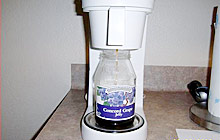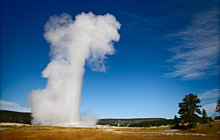
Blame the Pot, Not the Bean
One thing that can affect the quality of your coffee is the cleanliness of your pot or carafe. There are two sides to this piping hot debate.
One side argues that your carafe should be sterile enough for an operating theater. These Adrian Monk types feel that coffee residue builds up over time, making each brew more bitter. They suggest a complete hot soapy scrub three times a day.
The other side considers themselves to be quite highbrow. These are the soap-haters. They feel that coffee residue can be rinsed away with clear water, but soap leaves a residue that affects the purity of coffee.
Honestly, we're not the best people to settle this debate. Our coffee is bitter every time, even if it's the first pot from a brand new coffeemaker. One solution we do like: throw away your carafe altogether and use a new container every time to fire up the ol' Mr. Coffee (like this clever person: http://thereifixedit.com/2009/11/05/grape-flavored-coffee-yum/).

Microwaves Are for Leftovers
Coffee holds us captive, and we are victims with Stockholm syndrome. We have bonded with coffee, even though it can do us harm.
Here's an example. A French press can yield strong coffee, but be careful how you prepare your water. Microwave manufacturers include instructions about how to heat water. The strange thing is: if you use a microwave and a clean glass container like a French press, you can actualy heat water above boiling point. Because the glass container is so smooth, there is no place to trigger the creation of those churning boiling bubbles. When solid material (grounds) is added to the "superheated" water, it can instantly cause a boiling explosion (http://www.snopes.com/science/microwave.asp). That would spoil even our beans.
That's why we prefer a percolator. Nothing brings out the flavor like running boiled coffee back through used grounds. Just the sound of a percolator can provide a morning wake-up call.

It's All in the Water
The beverage coffee is one of the simplest recipes you will ever find. It has two parts: coffee and water. How hard can it be to make a good cup of coffee? Well, there is more to consider than the recipe would indicate. Our customers often (very often) tell us that our coffee tastes like a swamp. We always say that it must be the water.
Algae can affect the flavor of drinking water. When algae density in a water supply reservoir increases, known as an algal bloom, it changes the chemical composition of the water. Municipal water treatment centers do not always have the filtration system needed to correct this problem. If your water smells bad, particularly in the hottest months of the year, you might need to filter your drinking water at home.
So, if you really want coffee that tastes like a swamp, we certainly recommend using our beans, but using some really stinky water will take swampy to a new level.

One Man's Sludge is Another Man's Muck
Once you've savored the last cup of morning (or suffered through it, depending on who you buy your beans from), what do you do with the grounds? Most people throw them in the trash. There is an alternative.
Coffee grounds can be a nitrogen-rich fertilizer. People who own enough land to have a compost heap can improve the quality of their compost as well as speed up the composting process by adding coffee. However, the best thing about coffee as a fertilizer is that you don't have to compost it. You can spread it around just as it is, and it will work its magic without stinking up the joint. If you use our beans, mixing in some dirt actually makes it smell better.
Coffee can be used to fertilize just about anything, including flowers, vegetables, and even your lawn. So even if you find our coffee to be nearly indigestable, your plants will love it! You can read more at www.sustainableenterprises.com/Business/coffeefert.htm.
